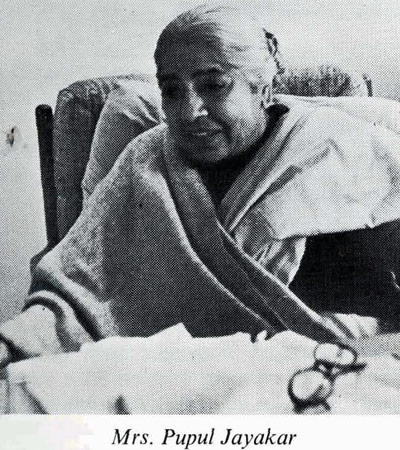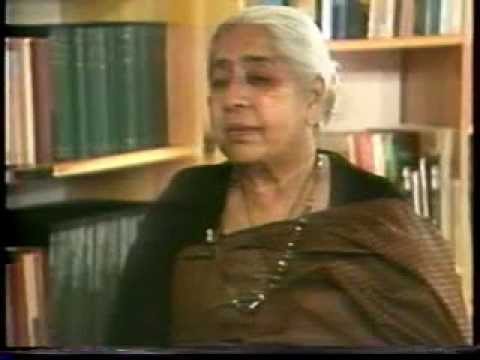Pupul Jayakar née Mehta (11 September 1915 – 29 March 1997) was an Indian cultural activist and writer, best known for her work on the revival of traditional and village arts, handlooms, and handicrafts in post-independence India. She organised a series of Indian arts festivals in the 1980s in France, the US and Japan that helped to popularize Indian arts in the West. She was a friend and biographer to both the Nehru-Gandhi family and J Krishnamurti. Jayakar had a close relationship with three prime ministers: Jawaharlal Nehru, his daughter Indira Gandhi and her son Rajiv Gandhi. She served as cultural adviser to latter two, confirming her preeminence in cultural matters. She “presided colossus-like over the country’s cultural scene for nearly 40 years,” founding key arts and crafts institutions and promoting talented artists, and Indian arts and crafts through festivals and exhibitions worldwide.

In 1950, Jawaharlal Nehru invited her to study the handloom sector and work out plans for its revival. Eventually she served as chair of the All-India Handloom Board and Handicrafts and Handlooms Export Corporation and played an important role in the revival of Madhubani painting. Jayakar founded the National Crafts Museum in 1956 and the Indian National Trust for Art and Cultural Heritage (INTACH) in 1984 to restore and manage monuments and advocate for heritage property conservation. She was a founder and trustee of the Indira Gandhi National Centre for the Arts (IGNCA), established in 1985 and in 1990 founded the National Institute of Fashion Technology in New Delhi. She was awarded the Padma Bhushan (India’s third highest civilian honor) in 1967.
Early life and education
Jayakar was born in 1915 at Etawah City in the state of United Provinces (later known as Uttar Pradesh). Her father was a liberal intellectual and senior officer in the Indian Civil Servicewhile her mother came from a Gujarati Brahmin family from Surat, where Pupul spent her yearly summer breaks. She had a brother, Kumaril Mehta, and four sisters, Purnima, Premlata, Amarganga and Nandini Mehta. Her father’s work took the family to many parts of India, where she got the opportunity to absorb local crafts and traditions early on in life.
At the age of eleven, she went to Banaras (Varanasi), where she studied in a school started by Annie Besant, theosophist, who was also active in Indian freedom movement. Subsequently, her father got posted to Allahabad, where she first came in contact with the Nehru family at age fifteen, as her father was a friend of Motilal Nehru. Later, she became friends with daughter of Jawaharlal Nehru, Indira Priyadarshini (later, Indira Gandhi).

She attended Bedford College in London before graduating from the London School of Economics in 1936. On returning home she married Manmohan Jayakar, a barrister, and settled down in Bombay (now Mumbai).
Books
Her best known books are her two biographies: J. Krishnamurti: A Biography (1988) and Indira Gandhi: An Intimate Biography (1992). In the latter, Jayakar reveals that her close friend Indira Gandhi had personally expressed to her a premonition of her death in the wake of the Operation Blue Star incident.
Hungryalist Movement
When the members of Hungryalist movement were arrested and cases were filed against them, Pupul Jayakar took up the matter with Indira Gandhi as a result of which Shakti Chattopadhyay, Sandipan Chattopadhyay, Binoy Majumdar, Sunil Gangopadhyay, Saileswar Ghosh, Subhash Gho0sh, Subo Acharya, Tridib Mitra, Falguni Roy, Basudeb Dasgupta, Subhash Ghose, Abani Dhar were exempted and case was filed against only Malay Roychoudhury as he was the leader of the movement and had become known throughout the literary world. However Malay Roychoudhury was ultimately exonerated by the Kolkata High Court.
Works
- God is not a full stop: and other stories. Kutub, 1949.
- Textiles and embroideries of India. Marg Publications, 1956.
- Textiles and ornaments of India: a selection of designs, with John Irwin. 1972.
- The Earthen Drum: an introduction to the ritual arts of rural India. National Museum, 1980.
- The Buddha: a book for the young. Vakils, Feffer & Simons, 1982.
- What I am: Indira Gandhi in conversation with Pupul Jayakar. Indira Gandhi Memorial Trust, 1986
- The Earth Mother. Penguin Books, 1989. ISBN 0-14-012352-0.
- Indira Gandhi: an intimate biography. Pantheon Books, 1992. ISBN 0-679-42479-2.
- The children of barren women: essays, investigations, stories. Penguin Books, 1994. ISBN 978-0-14-024068-9.
- Fire in the mind: dialogues with J. Krishnamurti. Penguin Books, 1995. ISBN 0-14-025166-9.
- J. Krishnamurti: a biography. Penguin Books, 1986. ISBN 0-14-019519-X.
